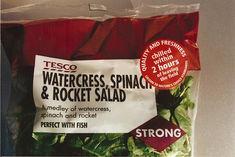
There are constant developments taking place in the packaging sector aimed at both making growers’ and packers’ lives easier, and addressing concerns for reduced or environmentally friendly packaging solutions.
Marks & Spencer this week announced that it would be rolling out the new Integrity Seal concept in the salad sector (see page 12) following successful trials by WRAP.
Integrity Seal makes use of heat to melt the film to make a welded seal on the ends just 1mm wide, rather than the traditional technique of crimping. The retailer hopes that as much as 10 percent of the packaging material used on salads could be saved by using the concept.
Meanwhile Marco, a manufacturer of soft fruit packhouse systems, has reported strong interest north of the border in its LineMaster workstations. Typical applications for the equipment see pre-packed punnets passing down the line, which are then placed one by one on the scales. The machine’s 16 segment coloured bar graph then gives a clear indication of whether the pack is over, under or within weight tolerance. Operators then add or remove fruit to achieve the correct target weight.
Marco has also developed its Automatic Optimisation self-learning software, whereby pack weight trends are constantly monitored by the system and tolerance settings at individual workstations are automatically adjusted on an ongoing basis.
MSM-Environmental Products has put its attention into developing products created from renewable plant biomass, a sustainable material that the firm says is 100 percent renewable, compostable and biodegradable. It is said to reduce waste and energy, conserving natural resources and reducing pollution.
The company’s sustainable products take a number of different forms in reality. In additional to ‘clam-shell’ lunchboxes and ‘4-apple’ trays, the biodegradable material can be moulded into a variety of different types of functional packaging, in a selection of different finishes and colours. The firm claims that this is then easily embossed and printed.
In the ornamental sector Mechanical Botanical has been promoting a range of labelling and packaging equipment from Willburg. The Willburg Hotmelt labeller is a system whereby the label stays on the pot, using an environmentally friendly semi-permanent adhesive. The firm describes its main benefits as being the rapid application of up to 3,000 labels per hour, the ability to adapt for different label shapes and greater marketing potential as customers can easily identify and choose from plants on display.
The approach sees two lines of hot glue applied to the pot and the pre-printed colour label applied by pneumatic air cylinder. For short runs it is also available with glue application only, for applying labels manually.
Also from Willburg is a low-cost precision labelling machine, a stand-alone system that can be mounted on the side of any make of conveyor system. The high capacity machine applies up to 10,000 labels per hour using a small label, with capacity decreasing as label size increases. It features an adjustable frame for easy locating of the labeller, and an extra long application beak keeping the label reels away from the labelled pots. Options include extra sponge rollers for applying larger labels and adjustable rails to support the pots.
Willburg is additionally offering a Print & Apply system, using the same application beak as the Labeller and an in-line printer from Avery on self-adhesive labels up to 105mm wide.
Other developments are the Willburg tagging machine, pot transfer system and extra wide despatch conveyor. The tagger features a knife system that makes a slot in the compost enabling the tag to be inserted at dispatch. The pot transfer system, situated at the end of the narrow conveyor, moves pots onto the wide storage belt.
In the vegetable sector UK firm Packaging Automation has reported good feedback from Kenyan produce firm AAA Growers, which grows, processes and exports fresh vegetables to the UK, Europe and South Africa.
The company has been using a PA182 tray sealer in its new prepared vegetable facility in Thika, where it is used alongside other equipment to pack peas, corn, sweetcorn and mixed vegetables, among other things.
The PA182 is a semi-automatic, hand turned rotary table machine, which features a hygienic design and can eliminate bug traps.
It is not just in terms of their actual packaging and labelling products where manufacturers are making progress. Hortipak, for instance, claims to have become leaner and increased efficiency by 50 percent in the past year following assistance from the Manufacturing Advisory Service. Yorkshire and Humber.
The steps it took included a seven day manufacturing improvement project which included coaching a core team of employees to introduce lean manufacturing techniques into the horticultural order processing department.
James Buffoni, horticultural co-ordinator and distribution manager for the company, explained: “The very nature of our business means that our operation has to be extremely flexible and efficient in order to manage huge seasonal fluctuations in demand for our labels, often dictated by unpredictable factors, such as the weather. Ever increasing customer demand for repeatable quality and shorter delivery times has led us to develop an extremely sophisticated and lean order processing, l manufacture and despatch process.”